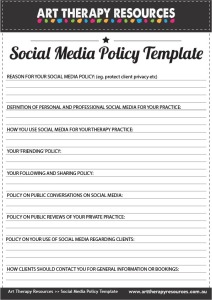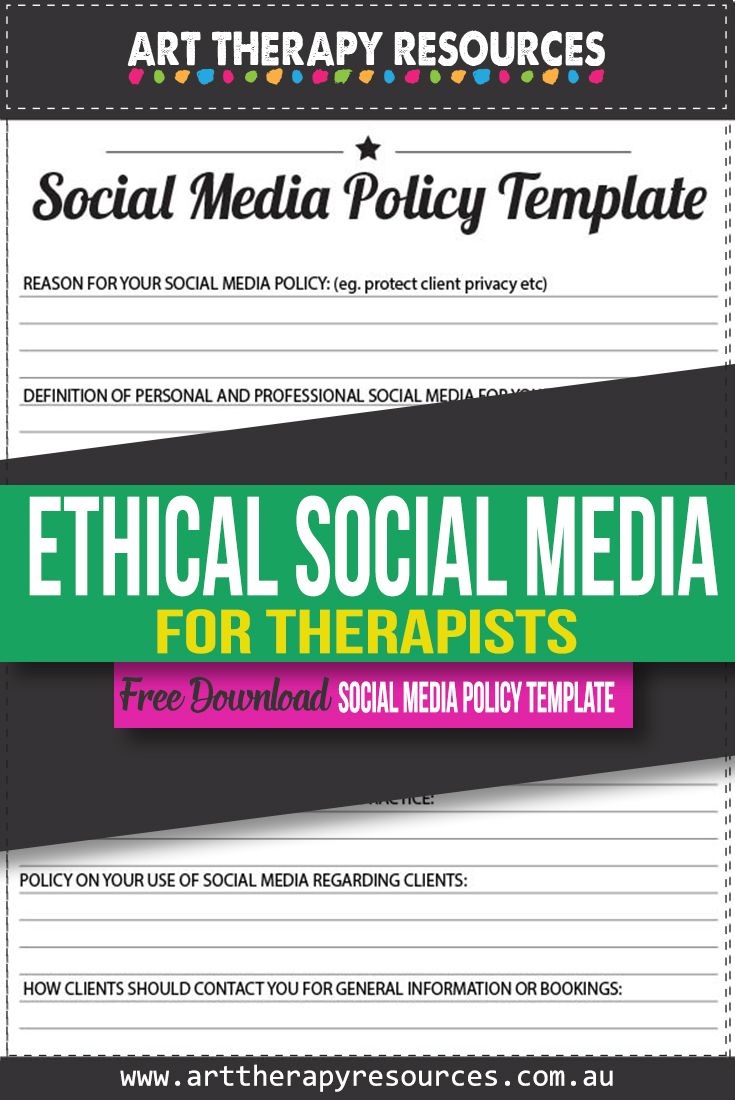THIS POST INCLUDES:
1. Professional Obligations
2. Client interactions
3. Your private social media
4. Social Media Policy
5. Free Download Social Media Policy Template
PROFESSIONAL OBLIGATIONS
Social media has presented society with many ethical dilemmas over the years. As it is a new medium that bridges both personal and professional use, many of us are defining boundaries of using social media on an as needed basis. This usually occurs as a result of a problem that has already happened. In many cases, social media policy is defined by lessons learned instead of foresight implemented.
As it has now been over a decade since social media was introduced, we are now starting to use hindsight to introduce new policies on how to handle future ethical use of social media.
As a professional, social media provides you with a unique ability to directly market your private practice to your potential clients. Therapists could previously advertise their business in more traditional methods such as yellow pages listings or radio advertising. These marketing strategies were usually rigid and presented a formal advertisement for your practice.
With social media, a therapist’s marketing methods are more interactive. Social media posts can turn into discussions, and live video has provided the ability to engage in live Q&A. All of these different marketing methods and ability to engage with clients introduce exciting new ways of communicating about our private practice, however, they also require us to follow our professional obligations to ensure our interactions are ethically sound.
ETHICAL PRINCIPLES TO CONSIDER
Below are some of the important ethical principles to consider when using social media as a therapist include:
- How you present yourself and your practice
- Marketing/advertising your practice
- Confidentiality of your clients
- Networking with other therapists and not discussing client through social media
- Maintaining records of interactions with clients
- Avoiding multiple relationships with clients
- Avoid seeking testimonials with clients through social media reviews
If you belong to a therapy association or organization, you can refer to their social media policy guidelines to help determine your social media communication strategy as a private practice.
CLIENT INTERACTIONS
The definition of client interactions can be confusing on social media as you are often dealing with the members of the general public who may not have formally become your client.
For people who are already your clients, the following interactions are classified as client interactions between you and your clients:
- Clients searching you
- Clients friending you
- Clients connecting with your social media pages
- Clients posting on your social media business page
- Clients contacting you through social media for business details
- Clients contacting you through social media about session information
In this post, we’ve mostly covered the situation where clients seek contact with you on social media. We also need to be mindful of our own interactions with clients on social media and ensure we don’t cross any ethical boundaries.
Therapists should refrain from searching about clients online. Reading published material about your client online can inadvertently create a biased view of your client. Many of us realise that social media presents an opportunity for users to develop a persona online that may not always reflect reality.
People can use social media as a tool that doesn’t reflect how they function in their ‘real life’. In this respect, social media can often present an inaccurate and curated view of a client’s life that is not beneficial to building an authentic client/therapist relationship.
YOUR PRIVATE SOCIAL MEDIA
The most common ethical dilemma between therapist and client on social media involves your client seeing a friend request or direct connection on social media through your private account.
If you haven’t already explained your social media policy, a client may attempt to friend you, and then you are presented with the task of having to decline or reject a friend request. To a client, this could represent a personal rejection which can become difficult in the client/therapist relationship.
This best approach if this situation arises is to address it and place it in context for your client to understand the boundaries of your personal and professional relationship with them. Your client should understand that these protocols are established for their protection as much as your own as a therapist.
For any personal social media accounts that you own you should consider implementing strong privacy controls that limit your posting to only friends that are already connected to your connect.
Regardless of any privacy controls that you use, you should always assume that what you post online is public for everyone to read. A common statement made by lawyers who advise on social media matters is to assume everything you post is published on the front page of the newspaper. When you make a post, ask yourself – would I be happy to share this information on the front page of a newspaper? If so, then press post.
You may assume your activity is private, however, you should always consider the possibility of a friend copy/pasting (innocently or not) any information that you write on your private page.
If you’ve never implemented a social media policy before, it’s a good idea to review your existing social media posts and delete or edit any content that you don’t wish to make public any longer.
SOCIAL MEDIA POLICY
WHY YOU SHOULD HAVE A SOCIAL MEDIA POLICY
Now that you’ve learned some important aspects of how social media can be used or misused in a therapeutic relationship, it’s important to develop a formal social media policy that you use to make your clients and potential clients aware of how you will interact with them across all social media platforms.
You can make your social media policy available to clients as part of your client intake process. You can also make your social media policy publicly available by publishing it on your website as well as on each social media platform. This will help set expectations with your potential clients from the start so they can begin interacting with you based on your policy.
Your social media policy can also help clients determine that you will maintain confidential and respectful communication with them.
WHAT TO INCLUDE IN YOUR SOCIAL MEDIA POLICY
Below are some of the fundamental points to include in your social media policy:
- Reason for your policy – identify benefits for your client
- The definition of personal and professional social media for your private practice
- How you use your social media accounts for your private practice
- Your friending policy
- Your following and sharing policy
- How conversations in public are viewed
- Reviews of your private practice
- How your clients should contact you for general information or information about their appointments
If you need help developing your social media policy, you can purchase our Admin package where you will find a sample developed social media policy to use in your private practice.
Check out the Admin package in our store here.
MORE READING ABOUT SOCIAL MEDIA:
For additional help on using social media in your private practice, check out our previous blog posts below:
- Review of Free Social Media Schedulers
- Tools for Organizing Your Social Media Content
- How to Create an Annual Social Media Plan in 60 mins
- Create a Social Media Workflow for a Therapy Practice
You may also be interested in the following articles online: Best practices for an online world (American Psychological Association)
For additional information on the use of social media for art therapists, you may be interested in: The Art Therapist’s Guide to Social Media: Connection, Community, and Creativity
FREE DOWNLOAD: Social Media Policy Template
SIGN UP below to download the FREE Social Media Policy Template

BUILD YOUR ART THERAPY REFERENCE MATERIALS:
Pin this image to your Pinterest board.

SHARE KNOWLEDGE & PASS IT ON:
If you’ve enjoyed this post, please share it on Facebook, Twitter, Pinterest. Thank you!
